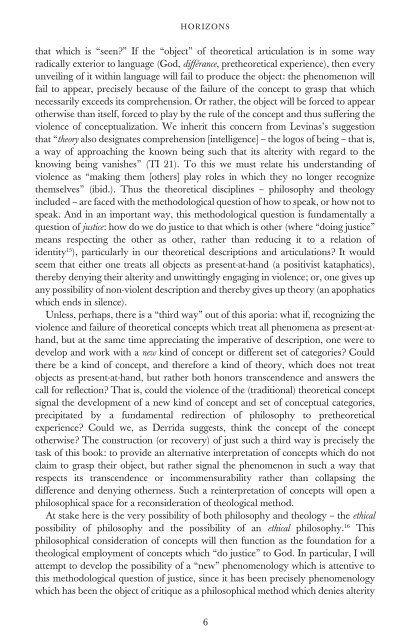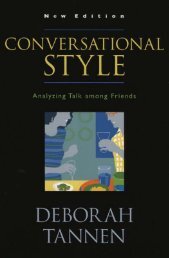Speech and Theology: Language and the Logic of Incarnation
Speech and Theology: Language and the Logic of Incarnation
Speech and Theology: Language and the Logic of Incarnation
Create successful ePaper yourself
Turn your PDF publications into a flip-book with our unique Google optimized e-Paper software.
HORIZONS<br />
that which is “seen?” If <strong>the</strong> “object” <strong>of</strong> <strong>the</strong>oretical articulation is in some way<br />
radically exterior to language (God, différance, pre<strong>the</strong>oretical experience), <strong>the</strong>n every<br />
unveiling <strong>of</strong> it within language will fail to produce <strong>the</strong> object: <strong>the</strong> phenomenon will<br />
fail to appear, precisely because <strong>of</strong> <strong>the</strong> failure <strong>of</strong> <strong>the</strong> concept to grasp that which<br />
necessarily exceeds its comprehension. Or ra<strong>the</strong>r, <strong>the</strong> object will be forced to appear<br />
o<strong>the</strong>rwise than itself, forced to play by <strong>the</strong> rule <strong>of</strong> <strong>the</strong> concept <strong>and</strong> thus suffering <strong>the</strong><br />
violence <strong>of</strong> conceptualization. We inherit this concern from Levinas’s suggestion<br />
that “<strong>the</strong>ory also designates comprehension [intelligence] – <strong>the</strong> logos <strong>of</strong> being – that is,<br />
a way <strong>of</strong> approaching <strong>the</strong> known being such that its alterity with regard to <strong>the</strong><br />
knowing being vanishes” (TI 21). To this we must relate his underst<strong>and</strong>ing <strong>of</strong><br />
violence as “making <strong>the</strong>m [o<strong>the</strong>rs] play roles in which <strong>the</strong>y no longer recognize<br />
<strong>the</strong>mselves” (ibid.). Thus <strong>the</strong> <strong>the</strong>oretical disciplines – philosophy <strong>and</strong> <strong>the</strong>ology<br />
included – are faced with <strong>the</strong> methodological question <strong>of</strong> how to speak, or how not to<br />
speak. And in an important way, this methodological question is fundamentally a<br />
question <strong>of</strong> justice: how do we do justice to that which is o<strong>the</strong>r (where “doing justice”<br />
means respecting <strong>the</strong> o<strong>the</strong>r as o<strong>the</strong>r, ra<strong>the</strong>r than reducing it to a relation <strong>of</strong><br />
identity 15 ), particularly in our <strong>the</strong>oretical descriptions <strong>and</strong> articulations? It would<br />
seem that ei<strong>the</strong>r one treats all objects as present-at-h<strong>and</strong> (a positivist kataphatics),<br />
<strong>the</strong>reby denying <strong>the</strong>ir alterity <strong>and</strong> unwittingly engaging in violence; or, one gives up<br />
any possibility <strong>of</strong> non-violent description <strong>and</strong> <strong>the</strong>reby gives up <strong>the</strong>ory (an apophatics<br />
which ends in silence).<br />
Unless, perhaps, <strong>the</strong>re is a “third way” out <strong>of</strong> this aporia: what if, recognizing <strong>the</strong><br />
violence <strong>and</strong> failure <strong>of</strong> <strong>the</strong>oretical concepts which treat all phenomena as present-ath<strong>and</strong>,<br />
but at <strong>the</strong> same time appreciating <strong>the</strong> imperative <strong>of</strong> description, one were to<br />
develop <strong>and</strong> work with a new kind <strong>of</strong> concept or different set <strong>of</strong> categories? Could<br />
<strong>the</strong>re be a kind <strong>of</strong> concept, <strong>and</strong> <strong>the</strong>refore a kind <strong>of</strong> <strong>the</strong>ory, which does not treat<br />
objects as present-at-h<strong>and</strong>, but ra<strong>the</strong>r both honors transcendence <strong>and</strong> answers <strong>the</strong><br />
call for reflection? That is, could <strong>the</strong> violence <strong>of</strong> <strong>the</strong> (traditional) <strong>the</strong>oretical concept<br />
signal <strong>the</strong> development <strong>of</strong> a new kind <strong>of</strong> concept <strong>and</strong> set <strong>of</strong> conceptual categories,<br />
precipitated by a fundamental redirection <strong>of</strong> philosophy to pre<strong>the</strong>oretical<br />
experience? Could we, as Derrida suggests, think <strong>the</strong> concept <strong>of</strong> <strong>the</strong> concept<br />
o<strong>the</strong>rwise? The construction (or recovery) <strong>of</strong> just such a third way is precisely <strong>the</strong><br />
task <strong>of</strong> this book: to provide an alternative interpretation <strong>of</strong> concepts which do not<br />
claim to grasp <strong>the</strong>ir object, but ra<strong>the</strong>r signal <strong>the</strong> phenomenon in such a way that<br />
respects its transcendence or incommensurability ra<strong>the</strong>r than collapsing <strong>the</strong><br />
difference <strong>and</strong> denying o<strong>the</strong>rness. Such a reinterpretation <strong>of</strong> concepts will open a<br />
philosophical space for a reconsideration <strong>of</strong> <strong>the</strong>ological method.<br />
At stake here is <strong>the</strong> very possibility <strong>of</strong> both philosophy <strong>and</strong> <strong>the</strong>ology – <strong>the</strong> ethical<br />
possibility <strong>of</strong> philosophy <strong>and</strong> <strong>the</strong> possibility <strong>of</strong> an ethical philosophy. 16 This<br />
philosophical consideration <strong>of</strong> concepts will <strong>the</strong>n function as <strong>the</strong> foundation for a<br />
<strong>the</strong>ological employment <strong>of</strong> concepts which “do justice” to God. In particular, I will<br />
attempt to develop <strong>the</strong> possibility <strong>of</strong> a “new” phenomenology which is attentive to<br />
this methodological question <strong>of</strong> justice, since it has been precisely phenomenology<br />
which has been <strong>the</strong> object <strong>of</strong> critique as a philosophical method which denies alterity<br />
6



